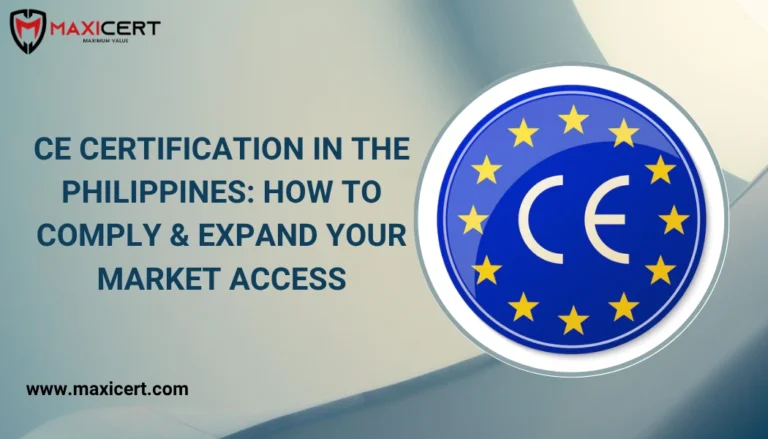CE Certification in the Philippines: How to Comply & Expand Your Market Access

Introduction
Selling products internationally—particularly in Europe—today in the global economy translates into complying with certain standards. For Filipino exporters, compliance with the CE standard is a crucial step towards accessing the European Union (EU) and international markets. This guide describes what CE certification entails, how Philippine companies can obtain it, and the actual-world advantages it offers.
What is CE Certification?
CE is short for Conformité Européenne, which means “European Conformity” in French. The CE mark is a label placed on many products sold within the European Union. It shows that a product follows all the important EU laws that protect people’s health, safety, and the environment.
The CE marking is not just a logo—it’s proof that the product has been tested or reviewed and found to meet EU standards. These rules apply to things like electronics, toys, medical devices, and machines.
Once your product has the CE mark, you can sell it freely in any of the 27 EU countries. You don’t need to get new approvals or tests in each country. Some other countries outside the EU also accept CE-marked products, which helps you reach even more international markets.
Getting CE certified builds trust. It shows buyers, importers, and government agencies that your product is safe, reliable, and made to global standards.
Request A Free Quote
Is CE Certification Mandatory in the Philippines?
CE certification is not mandatory for sales to the local market in the Philippines. However, if you are producing products for export—particularly to the European Union—CE compliance becomes mandatory.
Common CE-regulated goods are:
- Electrical and electronic equipment
- Industrial machinery and devices
- Medical devices
- Toys
- Personal protective equipment (PPE)
CE marking should be considered by Filipino manufacturers and exporters seeking to be globally competitive.
Major Advantages of CE Marking for Filipino Businesses
Smooth Entry to EU Markets
- Escape trade barriers by compliance with EU product directives.
Generate Consumer Confidence
- CE marks are recognized globally as product safety and quality symbols.
Enhance Global Competitiveness
- Distinguish your product in both domestic and international tenders.
Increase Reputation and Compliance
- Comply with leading-edge manufacturing and safety standards.
CE Certification Requirements
Technical Documentation
You need to prepare a technical file which demonstrates your product meets the applicable directives. These are:
- Risk assessments
- Test reports
- Assembly drawings and schematics
- Instruction manuals
Conformity Assessment Procedures
Your product might require:
- Self-declaration (for low-risk products), or
- Third-party certification by an EU-recognized Notified Body for higher-risk products.
Declaration of Conformity (DoC)
This CE document guarantees that the product fulfills every CE requirement. It should contain:
- Manufacturer’s details
- Relevant EU directives and standards
- Signature of the responsible party
Placing the CE Mark
- After being made compliant, place the CE mark clearly on the product, packaging, or materials provided. It should adhere to EU design principles.
Learn more about CE marking requirements from the European Commission.
Step-by-Step: How to Get CE Certified in the Philippines

Typical CE Compliance Mistakes to avoid
- Utilizing out-of-date EU directives
- Misusing the CE mark
- Not performing adequate product testing
- Insufficient or lacking technical documentation
- Selecting an unaccredited lab or consultancy
How Long Does CE Certification Take in the Philippines?
4 to 12 weeks is standard
Timeframes vary depending on:
- Product complexity
- Testing requirements
- Notified Body participation
- Quality of your technical file
Tip: Factor in extra time if translation or EU-recognized testing is involved.
What Affects the Price of CE Certification in the Philippines?
CE marking isn’t a one-size-fits-all affair, and the cost does not lie. Costs can be very different based on:
- Complexity of the product – Less complex products are less expensive to test and certify.
- Testing and standards needed – Some products need several tests at the lab.
- Third-party assessment requirement – High-risk products necessitate third-party evaluation, increasing the cost.
- Scope of documentation – It can be time-consuming to prepare a complete technical file and DoC.
While it may seem like a significant upfront cost, CE certification can unlock long-term export growth and global buyer trust.
Work with Trusted Experts to Achieve CE Marking
Achieving CE compliance can be complex, especially if you’re unfamiliar with EU laws or technical standards. Partnering with experienced consultants like Maxicert ensures:
- Proper identification of applicable directives
- Error-free documentation and labeling
- Efficient lab testing coordination
- Faster CE approvals with full compliance
Discover our ISO certification services in the Philippines
Find out more about CE certification assistance from Maxicert
Conclusion
CE certification is not free of charge, but the return on investment is clear—global market access, customer trust, and long-term growth.
At Maxicert, we make the whole process of CE certification for Philippine companies easy—from strategy and lab tests to technical documentation and final approval. If you’re just beginning to export or expanding globally, we assist you every step of the way.
Start with Maxicert Today and get started on Europe-ready products

Get In Touch

Get In Touch

Get In Touch
Need A Free Estimate?
Get a free consultation and Checklist to get certified for ISO , HALAL, CE Mark Certification.
FAQ
Is CE certification universal?
CE is mostly for the EU, but other markets see it as a quality mark.
Can I self-certify my product?
Higher-risk groups need Notified Body participation.
Is CE necessary for all exports?
It is required if your product is selling in EU or CE-recognizing markets
Can I utilize a testing laboratory in the Philippines?
Yes, if the lab is accredited and complies with EU standards.



